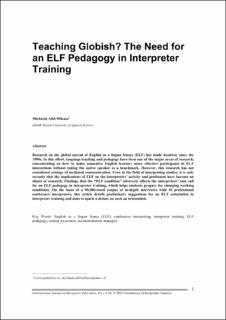Please use this identifier to cite or link to this item:
https://doi.org/10.21256/zhaw-4072Full metadata record
| DC Field | Value | Language |
|---|---|---|
| dc.contributor.author | Albl-Mikasa, Michaela | - |
| dc.date.accessioned | 2018-02-01T07:23:01Z | - |
| dc.date.available | 2018-02-01T07:23:01Z | - |
| dc.date.issued | 2013 | - |
| dc.identifier.issn | 2150-5772 | de_CH |
| dc.identifier.uri | https://digitalcollection.zhaw.ch/handle/11475/2440 | - |
| dc.description.abstract | Research on the global spread of English as a lingua franca (ELF) has made headway since the 1990s. In this effort, language teaching and pedagogy have been one of the major areas of research, concentrating on how to make nonnative English learners more effective participants in ELF interactions without taking the native speaker as a benchmark. However, this research has not considered settings of mediated communication. Even in the field of interpreting studies, it is only recently that the implications of ELF on the interpreters’ activity and profession have become an object of research. Findings that the “ELF condition” adversely affects the interpreters’ task call for an ELF pedagogy in interpreter training, which helps students prepare for changing working conditions. On the basis of a 90,000-word corpus of in-depth interviews with 10 professional conference interpreters, this article details preliminary suggestions for an ELF orientation in interpreter training and aims to spark a debate on such an orientation. | de_CH |
| dc.language.iso | en | de_CH |
| dc.publisher | Conference of Interpreter Trainers | de_CH |
| dc.relation.ispartof | International Journal of Interpreter Education | de_CH |
| dc.rights | Licence according to publishing contract | de_CH |
| dc.subject | ELF pedagogy | de_CH |
| dc.subject | English as a lingua franca | de_CH |
| dc.subject | Interpreter training | de_CH |
| dc.subject | Conference interpreting | de_CH |
| dc.subject.ddc | 418.02: Translationswissenschaft | de_CH |
| dc.title | Teaching Globish? : the need for an ELF-pedagogy in interpreter training | de_CH |
| dc.type | Beitrag in wissenschaftlicher Zeitschrift | de_CH |
| dcterms.type | Text | de_CH |
| zhaw.departement | Angewandte Linguistik | de_CH |
| zhaw.organisationalunit | Institut für Übersetzen und Dolmetschen (IUED) | de_CH |
| dc.identifier.doi | 10.21256/zhaw-4072 | - |
| zhaw.funding.eu | No | de_CH |
| zhaw.issue | 1 | de_CH |
| zhaw.originated.zhaw | Yes | de_CH |
| zhaw.pages.end | 16 | de_CH |
| zhaw.pages.start | 3 | de_CH |
| zhaw.publication.status | publishedVersion | de_CH |
| zhaw.volume | 5 | de_CH |
| zhaw.publication.review | Peer review (Publikation) | de_CH |
| zhaw.webfeed | Dolmetschwissenschaft | de_CH |
| Appears in collections: | Publikationen Angewandte Linguistik | |
Files in This Item:
| File | Description | Size | Format | |
|---|---|---|---|---|
| 2013_Alb-Mikasa_Teaching Globish_International Journal of Interpreter Education.pdf | 233.42 kB | Adobe PDF |  View/Open |
Show simple item record
Albl-Mikasa, M. (2013). Teaching Globish? : the need for an ELF-pedagogy in interpreter training. International Journal of Interpreter Education, 5(1), 3–16. https://doi.org/10.21256/zhaw-4072
Albl-Mikasa, M. (2013) ‘Teaching Globish? : the need for an ELF-pedagogy in interpreter training’, International Journal of Interpreter Education, 5(1), pp. 3–16. Available at: https://doi.org/10.21256/zhaw-4072.
M. Albl-Mikasa, “Teaching Globish? : the need for an ELF-pedagogy in interpreter training,” International Journal of Interpreter Education, vol. 5, no. 1, pp. 3–16, 2013, doi: 10.21256/zhaw-4072.
ALBL-MIKASA, Michaela, 2013. Teaching Globish? : the need for an ELF-pedagogy in interpreter training. International Journal of Interpreter Education. 2013. Bd. 5, Nr. 1, S. 3–16. DOI 10.21256/zhaw-4072
Albl-Mikasa, Michaela. 2013. “Teaching Globish? : The Need for an ELF-Pedagogy in Interpreter Training.” International Journal of Interpreter Education 5 (1): 3–16. https://doi.org/10.21256/zhaw-4072.
Albl-Mikasa, Michaela. “Teaching Globish? : The Need for an ELF-Pedagogy in Interpreter Training.” International Journal of Interpreter Education, vol. 5, no. 1, 2013, pp. 3–16, https://doi.org/10.21256/zhaw-4072.
Items in DSpace are protected by copyright, with all rights reserved, unless otherwise indicated.